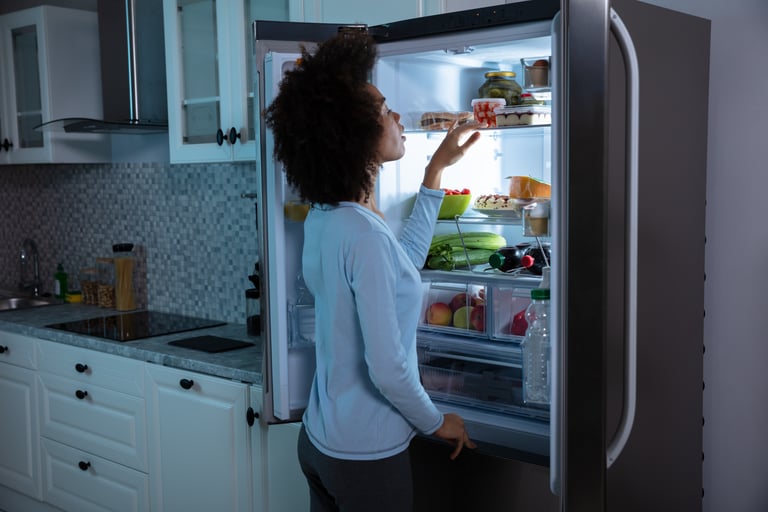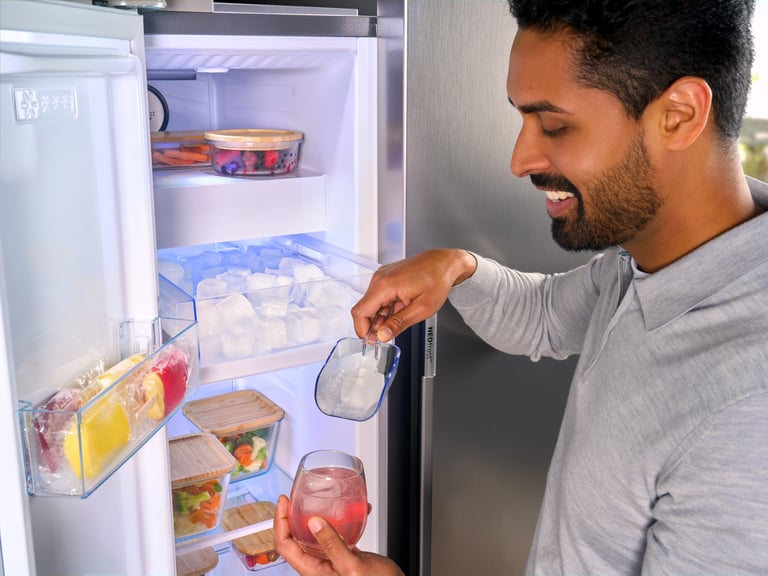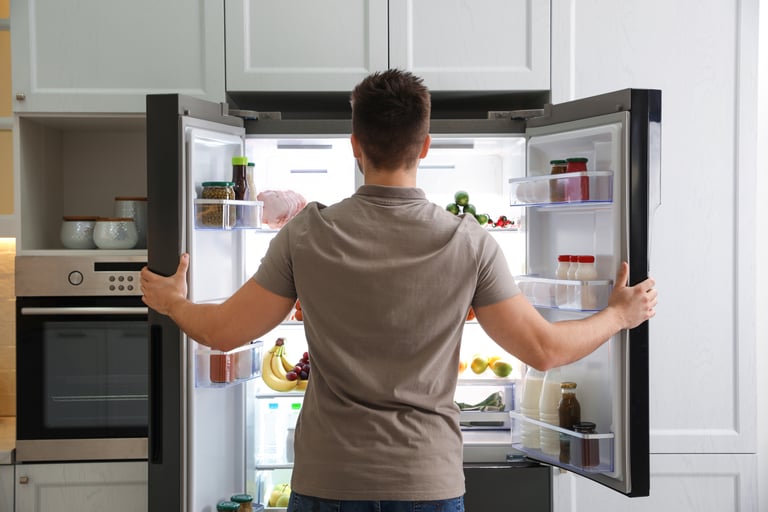
Is It Worth Repairing a Fridge Freezer?
No matter how much we look after our fridge freezers, there will be times when they suffer a breakdown – just like with any home appliance.
As a broken fridge freezer risks food spoilage though, you’ll be looking for a very quick resolution to get this particular appliance functioning as normal again and avoid too much of your food shop going to waste.
Due to this urgency, you’re very likely to instantly weigh up an expected fridge freezer repair cost bill with the price of a new appliance and wonder which option will be best.
To help you understand whether to repair your fridge freezer, we’ve pulled together this helpful guide. We'll walk you through the costs of common repairs, compare these with the price of new models, and delve into the benefits of upgrading.
Understanding Fridge Freezer Repair Costs
Repair costs for fridge freezers can vary widely, depending on the nature of the problem and the model. To make an informed decision, it’s important to understand these costs before deciding whether to repair your product or buy a new one.
According to research carried out by Checkatrade, the average cost to repair a domestic appliance in the UK is between £40 and £80 per hour.
This rate will differ depending on the following factors mind:
- Where you live
- The age and condition of the broken appliance
- The make and model of the appliance
- The extent of the damage that needs to be repaired
While there are a few factors to consider, this average cost provides a ballpark figure of the amount you’ll need to invest to get your appliance back in working order.

Common Issues
A separate Checkatrade study has focused on the fridge freezer repair costs that you can expect in the UK if this appliance develops a fault:
- To supply and fit a new thermostat – Between £60 and £130
- To repair a fridge freezer’s ice maker – Between £70 and £420
- To replace the defrost timer or mechanism – Between £80 and £165
- To supply and fit a new door seal or gasket – Between £95 and £150
- To repair a fridge freezer’s compressor – Between £300 and £480
There are a few common problems to be aware of, which will indicate that your fridge freezer isn’t working properly. Ask yourself:
- Is the fridge section of your appliance freezing food?
- Is there substantial ice build-up in the freezer compartment?
- Do you find that either the fridge or freezer part is not as cold as it usually is?
- Does water leak from the appliance?
- Has your fridge freezer started to make an unusual noise?
Repair Costs vs. Purchase Costs

Once you’ve found the fault with your fridge freezer and how much it’ll cost to get the appliance working again, you’ll need to decide to either get it fixed or replace it.
A common rule of thumb is that it’s better to replace a household appliance if the repair cost exceeds 50 per cent of the price of a new appliance. As the price of a new fridge freezer varies in price depending on the model that’ll suit your needs, you’ll need to decide which new appliance you’d be buying before you work out these cost comparisons.
Comparing the costs of repairs with the price of a new fridge freezer is essential when deciding whether to repair or replace your appliance. Minor repairs, such as fixing a faulty thermostat or replacing door seals, may only cost between £50 and £100, which is significantly less than the price of a new fridge freezer, which can range from £300 to over £1,000. However, major repairs, like replacing a compressor, can be as expensive as purchasing a new unit. Over time, frequent repairs can add up, making a new purchase more economical in the long run.
If you own a Beko appliance, it's worth checking if your model is covered by Beko's Free 10-Year Spare Parts Guarantee. Available on all fridge freezers from 2024, this guarantee ensures that you only need to cover the cost of labour, not the parts themselves, significantly reducing repair expenses. To benefit from this offer, be sure to register your appliance within 90 days of purchase. By evaluating your appliance's repair history, potential future costs, and available warranties, you can make the most financially sensible decision.
Don’t forget to consider the cost of other repairs that you’ve had to make to your fridge freezer over the years too. Continuing to spend money on an old appliance won’t make financial sense, as it’ll prove more cost-effective to replace it.
Advantages of Upgrading to a New Fridge Freezer
There are various signs that’ll indicate when it’s time to replace a fridge freezer.
Technology keeps on advancing all the time, so an appliance that was state-of-the-art around a decade ago may now be lacking handy features.
Newer fridge freezers are often also more energy-efficient than their older counterparts, so choosing to replace the appliance can see you save money on your energy bills.
Look around your kitchen too. If you’ve made improvements to your home since you bought your last fridge freezer, does it still fit with the room’s design and your current lifestyle?

Energy Efficiency
Having an outdated fridge freezer will be adding so much money to your home energy bills. Modern appliances are designed to run at a lower cost – many can even perform activities such as defrosting automatically.
Uswitch energy expert Ben Gallizzi has pointed out to The Guardian that those shopping for a new fridge freezer should focus on an appliance’s energy-efficiency label as much as it’s price tag.
He explained: “You might save yourself £100 by getting a budget appliance, but you could be left paying a hefty bill as some devices can cost five times as much to run as their more energy-efficient alternatives.”
We have a huge range of excellent energy-efficient fridge freezers available here at Beko. Take our Freestanding AeroFlow™ Fridge Freezer with HarvestFresh™, for instance. This appliance comes equipped with intelligent features which ensures optimal food preservation, as well as being designed to deliver top class efficiency and ultra-low running costs. In fact, it has achieved a gold standard for energy savings by independent energy insights platform Youreko.
New Features
Ask yourself, does the current fridge freezer in your home have the following practical features:
- Adjustable door racks and bottle grips
- Alarms to alert you that the appliance’s door is open
- A modern display on the inside or outside of the door
These additions are all designed to make your life easier, as do the following which are exclusive to certain Beko fridge freezers:
- HarvestFresh™ - A feature that preserves the vitamins in fruit and vegetables using innovative three-colour light technology
- AeroFlow™ - ensures up to 30% longer freshness by gently distributing air to minimise temperature fluctuations and maintain consistent conditions throughout the fridge.
- MultiZone® - Switch a compartment of the appliance from fridge to freezer and back again at the touch a button with this feature
- Freezer Guard – This technology ensures that frozen food remains protected even when the surrounding temperature drops as low as -15°C.

The Impact of Repairing vs. Replacing
Deciding whether to repair or replace your fridge freezer has broader implications beyond immediate costs.

Environmental
Repairing your existing appliance can be more environmentally friendly than purchasing a new one. Manufacturing and transporting new fridge freezers contribute to carbon emissions while repairing extends the life of the current unit, reducing waste. However, as previously mentioned, older models may be less energy-efficient than newer appliances, which can offset the environmental benefits. Balancing these factors is crucial in making an eco-conscious decision.

Economic
Economically, the decision to repair or replace affects both your short-term and long-term finances. While repairing your appliance might save money in the short term, continually fixing an old, inefficient appliance can become more costly over time. Conversely, investing in a new, energy-efficient model can lead to savings on energy bills and fewer repair costs down the line. Considering both immediate expenses and future savings is essential.
When to Repair and When to Replace

There are times when you can perform your own maintenance tasks on your fridge freezer. These include:
- Changing the filter on a water dispenser every six months (or every three months if used frequently)
- Changing the filter on an ice maker every six months (again, or every three months if used frequently)
- Using a thermometer to check that the appliance’s temperatures are within the correct range on a regular basis
When dealing with electrical goods though, it is highly recommended that you hire a professional to carry out the repairs as many problems will involve new parts being fitted. Only those with the experience and skills to perform these tasks should be carrying out this work.
If you feel it’s better to repair your fridge freezer rather than replace it, be sure to check out the Beko Repair & Care maintenance plan on our repair support page. One of our expert engineers will fix your appliance quickly and in a professional manner. You’ll then be able to be protected against the cost of repairs for a further 12 months.

Current Model Lifespan
Fixing appliances became much more accessible across the UK when the nation was introduced to the right to repair law.
With this scheme in place, manufacturers are required to supply replacement parts for their products. Furthermore, these parts must be available within two years of an appliance going on sale and then must also remain available up to ten years after the appliance has been discontinued.
However, the typical lifespan of a fridge freezer is between ten and 15 years. If your appliance has developed a fault and is around this age, you should think about buying a new model rather than risk preserving an older fridge freezer that may keep breaking down.
Signs It's Time for a Replacement
Several signs indicate it might be time to replace your fridge freezer. If it’s consistently noisy, not maintaining temperatures, or if you’ve noticed a significant increase in your energy bills, these are strong indicators that the appliance is failing. Frequent repairs are another red flag; if you find yourself calling the repair technician more often, it might be more economical to invest in a new unit.
Deciding whether to repair or replace a fridge freezer involves weighing the costs of repairs against the benefits of new models, considering energy efficiency, and evaluating the overall impact on both your wallet and the environment. By carefully assessing these factors, you can make a choice that best suits your needs and circumstances.



